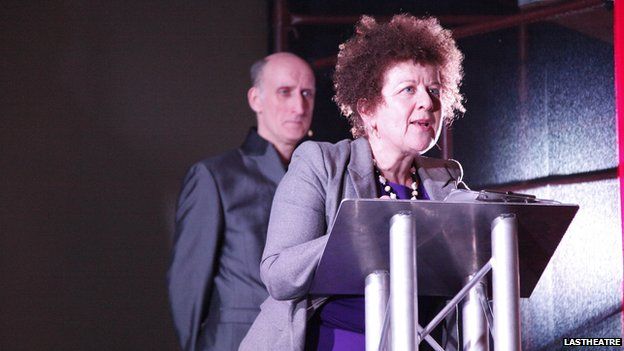Scientists take to the stage on climate change
- Published

New Atlantis: As well as actors - seen here - the cast includes scientists
The lives of scientists have been played out on screen in recent months, from The Imitation Game to The Theory of Everything, which are up for several film awards. Now researchers are appearing on stage as themselves, to explore topics such as climate change, writes Helen Briggs.
It's 2050 and the world is grappling with the consequences of a warmer climate. Miami has been abandoned as sea levels rise, while London is stricken with drought.
"As ice turns to water in the Arctic, New Atlantis turns stopcocks in London," trumpet the headlines in the newspapers. "As civilisation drowns, London is faced with drought and water curfews."
At the futuristic venue, The Crystal, on the Thames in East London, the cast of New Atlantis is rehearsing for the new production, named after a fictitious intergovernmental organisation managing water supply in the capital.
Various arguments about policy break out as the actors rehearse their lines. "Only centralisation of water management and the defence against greed and hostile use of the resource can continue New Atlantis' work," says the General.
"What is needed now is reform - we need to see changes in attitudes and changes in lifestyle," says another employee of New Atlantis.
This is immersive theatre, where, apart from set pieces, actors are obliged to go off script.
Members of the audience take on the role of the agents of New Atlantis - and are asked to vote on what actions to pursue - while real scientists are called upon to give their advice.
Rabbit hole
"We think that using real scientists adds a whole level of depth to the shows," says artistic director Barra Collins.
The show is about entertainment, but it is also about getting scientific information across in a unique and interesting way.
"The audience, if they find something interesting in the narrative, can really quiz the scientists and the scientists can allow them to go down the rabbit hole of that train of thought," he says.
"It's about being truly interactive and allowing the audience and the scientists to go on tangents of thought and discovery, within the show."
Collins has been working for two years with scientists to create an authentic vision of the future alongside creative producer, Andy Franzkowiak.
"With the scientists, we very much ask them to play themselves," says Franzkowiak.
"What they do within the show is buy into the narrative so they base themselves in 2050, but then they fast fall into their own research, which is fascinating - from oceans to Antarctica to how London needs to be re-engineered."
New Atlantis is a fictitious intergovernmental organisation
Films about the lives of scientists are up for major awards
He says the show is about climate change among other things, which he describes as a front line conversation at the moment.
"This show falls perhaps one end as activism in the arts because we want people to engage with that conversation but from a knowledgeable scientific standpoint.
"Both those go hand in hand - the science and the arts - in this conversation, and actually trying to bring audiences into it."
On a pedestal
A goal of the project is to encourage the audience to want to explore and perhaps even change their lifestyles.
"One of the most fundamental important things about this show is every individual understanding their role within that climate change conversation," says Franzkowiak.
"That it's not just for other people to deal with, that it's perhaps for all of us to deal with."
Among the scientists in the show is Dr Helen Czerski of UCL, known for her TV presenting work. She says she talks about her scientific work in the context of a drama where actors are talking about information.
The benefit of having real scientists, she says, is authenticity and giving an insight into the process of science.
"One of the problems I think with the dramas about science is that the scientist in the drama is this separate being.
"They're almost put on a pedestal and they're looked at as if they're this other creature. We're just people doing a job and that's also part of the message.
"The benefit of having us there is that it shows that everyone can be part of this process - science isn't a completely separate thing from the rest of society."
2071
Prof Chris Rapley of UCL - former director of the British Antarctic Survey and a leading climate scientist - gave a solo performance on London's West End stage last year in the play, 2071.
It offered a dramatised view on what life might be like later this century with continued emissions of greenhouse gases.
He described writing the script with the playwright, Duncan Macmillan, as a lesson in the development of dramatic narrative in contrast to the "information deficit " approach used in academia.
"We found ourselves constantly struggling to find the right balance to ensure that the content was 'simple enough, but not simpler'," he said.